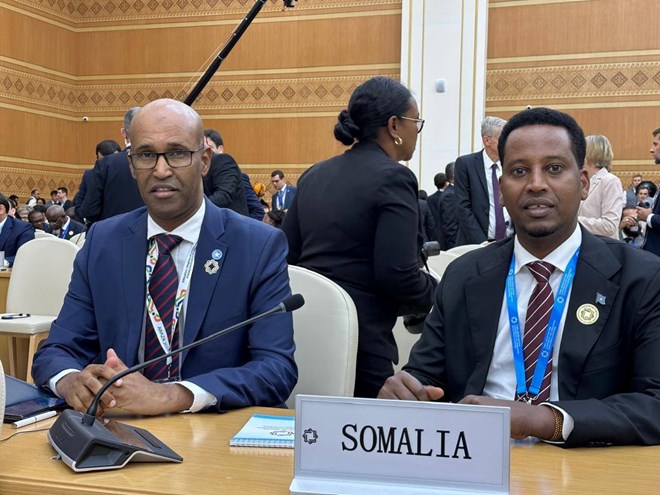
Wednesday August 6, 2025

Mogadishu (HOL) – Somalia’s Deputy Minister of Foreign
Affairs and International Cooperation, Isaak Mohamud Mursal, participated in
the Third United Nations Conference on Landlocked Developing Countries (LLDC3),
held on Tuesday in Awaza, Turkmenistan.
He was joined by Ambassador Fathudin Ali Mohamed, Somalia’s
Ambassador to Ankara and non-resident Ambassador to Turkmenistan.
The conference, which runs from August 5 to 8, is focused on
improving trade, connectivity, and the movement of goods and people between
landlocked and coastal nations. LLDCs often face high trade costs and delays
due to their lack of direct access to the sea and reliance on transit
countries.
“While Somalia is not a landlocked country, it is classified
as a Least Developed Country. Its participation in the conference underscores
efforts to enhance regional cooperation and explore solutions that support
sustainable development,” the Ministry of Foreign Affairs said in a statement.
Held under the theme “Driving Progress through
Partnerships,” the conference brought together global leaders, policymakers,
and stakeholders to address the challenges faced by the world’s 32 landlocked
developing countries (LLDCs), home to over 600 million people. The goal is to
accelerate sustainable development through enhanced cooperation, trade
facilitation, and infrastructure investment.
UN Secretary-General António Guterres, in his opening
remarks, emphasized the urgency of collective action. “Despite representing 7
percent of the world’s population, LLDCs account for just over one percent of
the global economy and trade – a stark example of deep inequalities that
perpetuate marginalization. These inequalities are not inevitable,” he said.
“This conference is not about obstacles. It is about solutions. It is about
launching a new decade of ambition – through the Awaza Programme of Action –
and fully unlocking the development potential of landlocked developing
countries.”
Turkmenistan’s President, Serdar Berdimuhamedov, echoed the
call for global solidarity in his address at the opening ceremony. “We proceed
from the necessity of aligning all economic activity with environmental
standards. The essence of our environmental policy is to ‘tune’ the economic
system in such a way that the production sphere is not a rival to nature, but
its ally and support,” he stated.